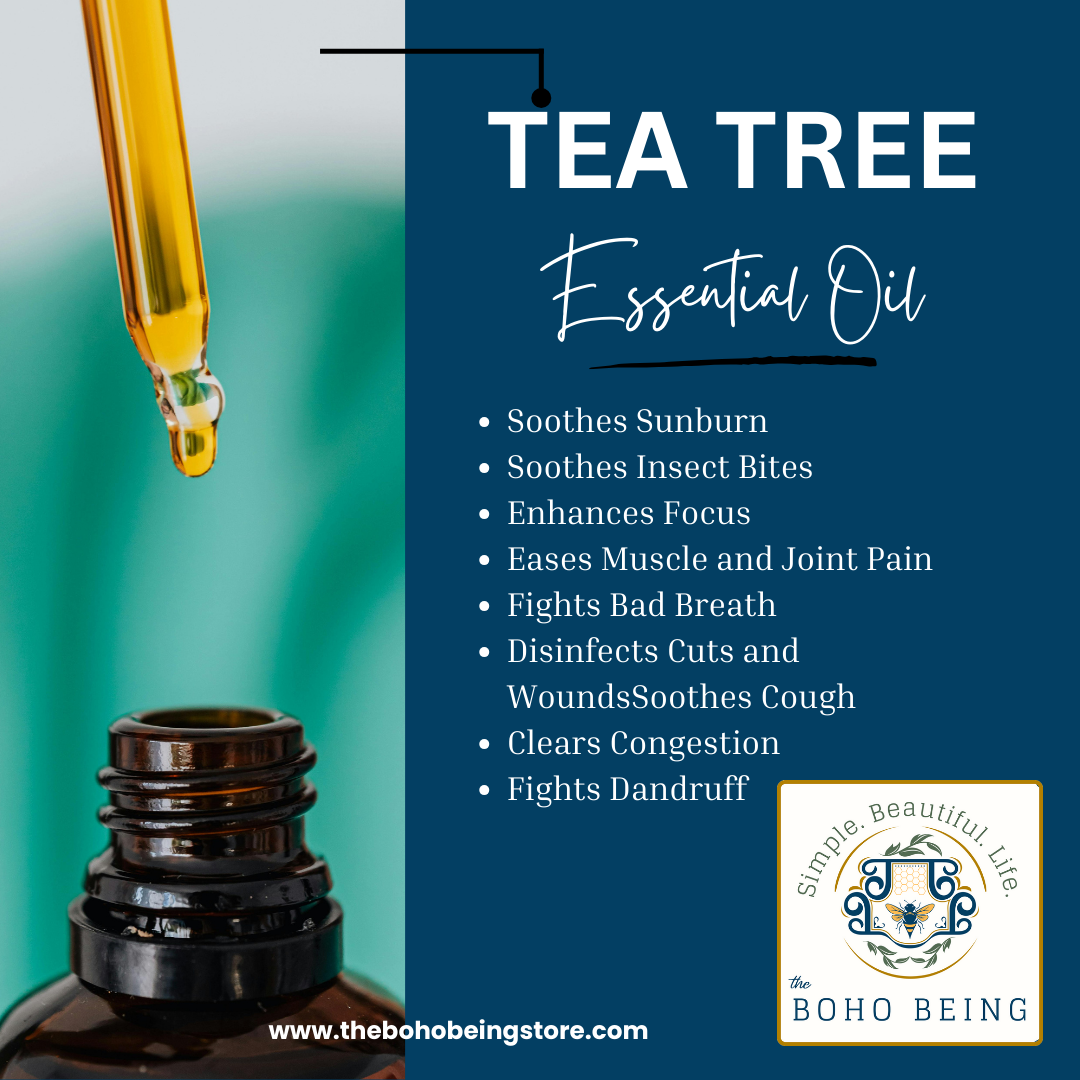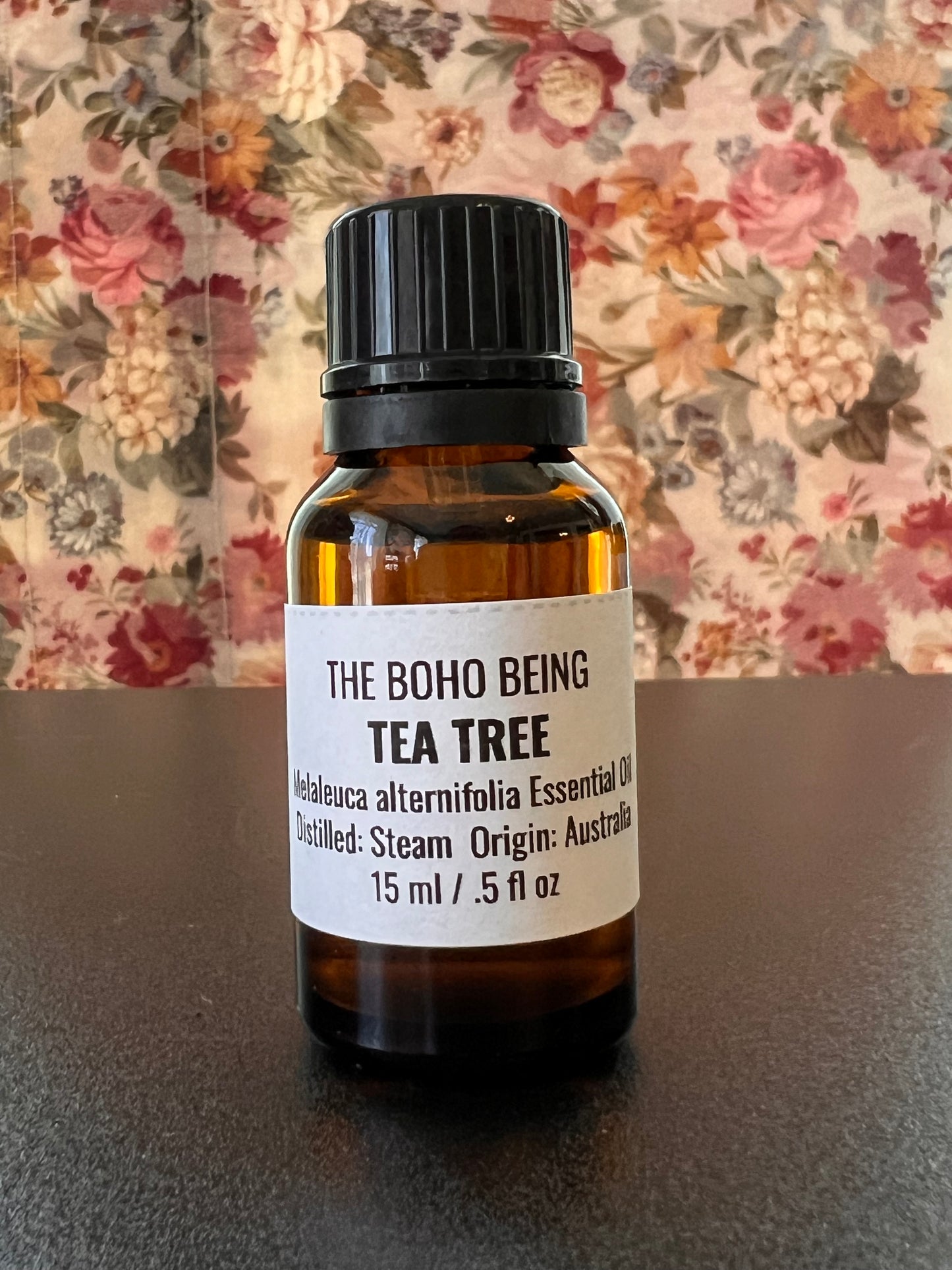Tea Tree Essential Oil 15ml(1/2oz)
Tea Tree Essential Oil 15ml(1/2oz)
Tea tree essential oil, extracted from the leaves of the Melaleuca alternifolia tree, is a powerful and versatile essential oil known for its wide range of therapeutic benefits. Here are some of the key benefits of tea tree essential oil:
1. Antimicrobial Properties:
- Fights Bacteria and Viruses: Tea tree oil is well-known for its strong antibacterial, antiviral, and antifungal properties, making it effective in treating various infections and preventing the spread of germs.
- Treats Fungal Infections: It’s commonly used to treat fungal infections like athlete’s foot, toenail fungus, and ringworm.
- Disinfects Cuts and Wounds: The oil can be applied to minor cuts, scrapes, and wounds to prevent infection and promote healing.
2. Skin Care:
- Treats Acne: Tea tree oil is highly effective in treating acne due to its ability to reduce inflammation, fight bacteria, and regulate oil production. It can be applied to blemishes to reduce their size and redness.
- Soothes Irritated Skin: The oil can help soothe and heal irritated skin, making it useful for conditions like eczema, psoriasis, and dermatitis.
- Reduces Inflammation: Its anti-inflammatory properties can help reduce the swelling and redness associated with various skin conditions.
3. Hair and Scalp Health:
- Fights Dandruff: Tea tree oil is commonly used to treat dandruff by reducing the yeast that contributes to flaking. It also helps soothe a dry, itchy scalp.
- Promotes Hair Growth: The oil can help improve scalp health and stimulate hair growth by unclogging hair follicles and nourishing the roots.
- Treats Lice: Tea tree oil is effective in treating and preventing head lice due to its insecticidal properties.
4. Respiratory Health:
- Clears Congestion: Inhaling tea tree oil can help clear nasal passages, reduce congestion, and relieve symptoms of respiratory conditions such as colds, sinusitis, and bronchitis.
- Soothes Cough: The oil can be used in steam inhalation to soothe a cough and relieve respiratory discomfort.
5. Oral Health:
- Fights Bad Breath: Tea tree oil’s antibacterial properties make it effective in killing the bacteria that cause bad breath and gum disease. It can be used as a mouthwash (when diluted) to promote oral hygiene.
- Reduces Plaque: The oil can help reduce plaque buildup and prevent cavities when used as part of a regular oral care routine.
6. Household Uses:
- Natural Cleaner: Tea tree oil is an excellent natural cleaner and disinfectant. It can be added to homemade cleaning solutions to disinfect surfaces, eliminate mold, and freshen the air.
- Insect Repellent: The oil can be used as a natural insect repellent, keeping away mosquitoes, ants, and other pests.
- Deodorizer: Tea tree oil can help neutralize odors, making it a great addition to natural deodorants and air fresheners.
7. Immune System Support:
- Boosts Immunity: Regular use of tea tree oil can help strengthen the immune system, making the body more resilient to infections and illnesses.
8. Pain Relief:
- Eases Muscle and Joint Pain: Tea tree oil’s anti-inflammatory properties make it useful in relieving muscle and joint pain, as well as reducing the discomfort associated with arthritis.
- Soothes Sunburn: The oil can be applied (when diluted) to sunburned skin to reduce pain, redness, and inflammation.
9. Deodorant and Antiperspirant:
- Natural Deodorant: Tea tree oil can be used as a natural deodorant due to its ability to kill odor-causing bacteria.
10. Treating Insect Bites and Stings:
- Soothes Insect Bites: Applying diluted tea tree oil to insect bites and stings can help reduce itching, swelling, and irritation.
11. Mental Clarity and Focus:
- Enhances Focus: The refreshing scent of tea tree oil can help improve focus, mental clarity, and alertness. It’s often used in aromatherapy to boost concentration and reduce mental fatigue.
When using tea tree essential oil, it's important to dilute it with a carrier oil before applying it to the skin, as it can cause irritation, especially for those with sensitive skin. Additionally, tea tree oil should not be ingested, as it can be toxic if swallowed. Always conduct a patch test before widespread use to ensure there is no allergic reaction.
Couldn't load pickup availability




